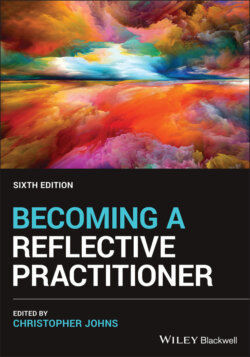Читать книгу Becoming a Reflective Practitioner - Группа авторов - Страница 35
Authority and Power
ОглавлениеOne aspect of tradition is the way authority works through power. Power is embodied through socialisation processes and reinforced through everyday patterns of relating. Hence it is normal and largely unchallenged. Subordinates get told what to do. Play the game, do as you are told, keep your head down to avoid sanction, and then one day you too will gain authority with power over others.
Force is the negative aspect of power used to ensure people conform to certain ways of behaviour endemic within transactional organisations such as the NHS whereby people are subordinate to authority transmitted down through its hierarchy where power is invested in positional roles. Positional power is laced with a coercive threat of sanction if resisted (French and Raven 1968) that can constrain the practitioner from taking desirable action. This works at every level of the organisation. Hence those who exert power at one level have power exerted on them from a higher level.
Power is also invested in professional roles – so for example, doctors often perceive themselves as superior to nurses, coining the expression nurses are the ‘doctor’s handmaiden’.
It can be argued that nursing, as a largely female workforce, has been oppressed by patriarchal attitudes that have rendered it docile and politically passive and thus limits its ability to fulfil its therapeutic potential. If so, then realising desirable practice would require an overthrow of oppressive political and cultural systems. The link between oppression and patriarchy is obvious, considering the way nursing has been viewed as women’s work, and the suppression of women’s voices in ‘knowing their place’ within the patriarchal order of things. Images of ‘behind the screens’ where women conceal their work, themselves, and their significance (Lawler 1991) and images of emotional labour being no more than women’s natural work, therefore unskilled and unvalued within the heroic stance of medicine (James 1989), are powerful signs of this oppression.
No easy task. Those in authority have vested interests to maintain the status quo, to keep people in their place rather than in the place they need to be in tune with realising their vision. Hence being in place becomes a contested arena. As Mayeroff (1971, p. 68) notes:
I am in‐place because of the way I relate to others. And place must be continually renewed and reaffirmed; it is not assured once and for all, for it is our response to the need of others to grow which gives us place.
Fear is a powerful deterrent for being different. It suppresses practitioners from voicing their opinions and asserting autonomy. Yet how comfortable are people in their illusions of truth? Is it better to conform than rock the boat? Is it better to sacrifice the ideal for a quiet life and patronage of more powerful others? Better to keep your head down than have it shot off above the parapet for daring to speak up?
Nurses are taught to ‘know their place’ within the order of things. It is natural for dominant professions such as medicine to reinforce subordinate behaviour in other healthcare professions, such as nursing (Oakley 1984). In other words, doctors are always motivated to maintain the status quo and resist rivalry for power. Nurses rationalise their compliance with medical domination because of the need to be valued. Chapman (1983) suggested that doctors reinforce nurses’ subordination through humiliation techniques that become a normative pattern of relating. Hence it becomes difficult for nurses to claim autonomy to move into the right place to practice desirably, kept in place by both managers and doctors. It is also the same with students and teachers. Even in Universities, teachers traditionally set the agenda and control the classroom. Students learn to be ‘good’ otherwise sanctions will ensue. Of course, some students like practitioners rebel against stifling authority. They are labelled ‘trouble makers’. They often quit rather than lead unsatisfactory lives.
